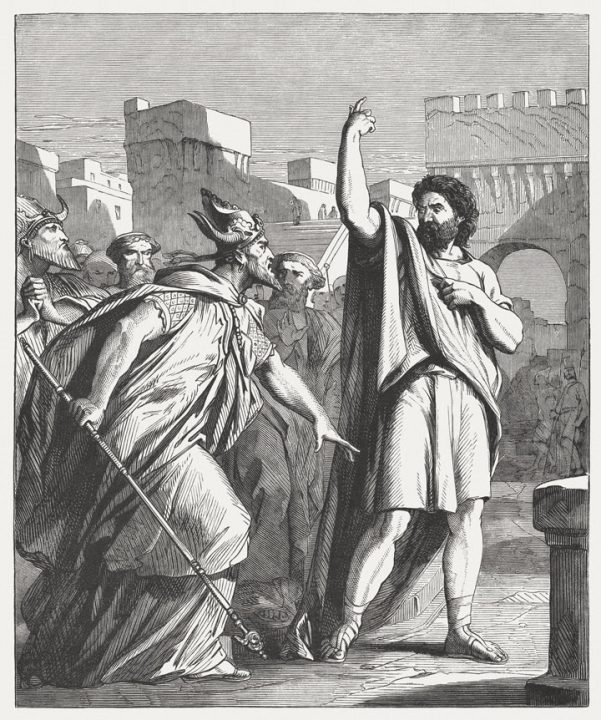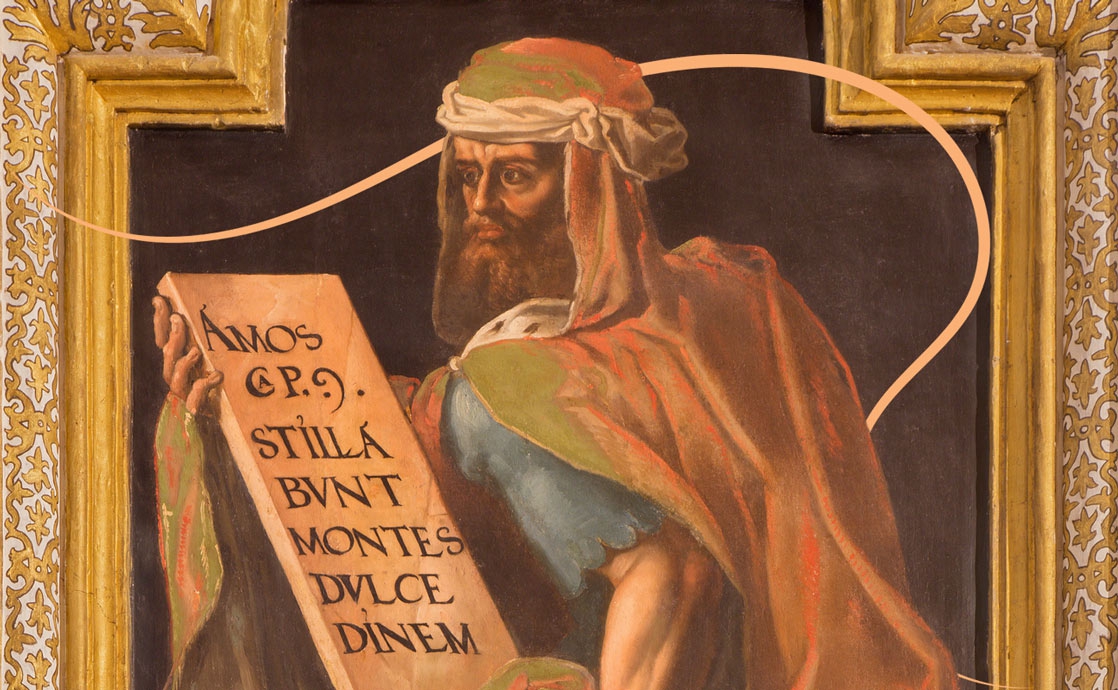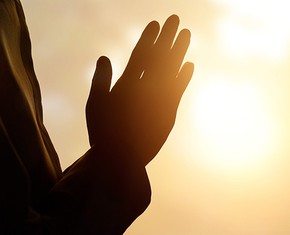The views expressed in our content reflect individual perspectives and do not represent the authoritative views of the Baha'i Faith.
Amos, the first of the Hebrew prophets and one of the original social justice warriors, addressed the moral issues of his day with acerbic anger and barbed diatribes against injustice and social inequity.
He warned of dire punishment to come if the people did not repent:
“Hear this word, you cows of Bashan on Mount Samaria,
you women who oppress the poor and crush the needy
and say to your husbands, “Bring us some drinks!”
The Sovereign Lord has sworn by his holiness:
’The time will surely come
when you will be taken away with hooks,
the last of you with fishhooks.’” – Amos 4:1–2. (The Assyrians often put hooks through the lips of their captives to control them.)
Amos railed against those who turned justice into bitterness and cast righteousness to the ground by depriving the poor of justice in the courts. He condemned the practice of levying a grain tax on poor farmers. Landowners no longer left the gleanings of the harvests for the poor, but harvested and sold the remnants.

Crooked practices in the marketplace did not escape Amos’s attention, such as skimping on the measure, boosting the price, and using dishonest scales. Amos condemned those who sell “the innocent for silver and the needy for a pair of sandal,” and who “trample on the heads of the poor as on the dust of the ground and deny justice to the oppressed.” – Amos 2:6, 7. He denounced the rich, who were oblivious to the plight of the poor or to Israel’s defiance of the Covenant:
“You lie on beds adorned with ivory
and lounge on your couches.
You dine on choice lambs
and fattened calves.
You strum away on your harps like David
and improvise on musical instruments.
You drink wine by the bowlful
and use the finest lotions,
but you do not grieve over the ruin of Joseph.
Therefore you will be among the first to go into exile;
your feasting and lounging will end.” – Amos 6:4–7.
Amos promised that divine retribution would come, repeatedly giving explicit warnings from God such as, “Now then, I will crush you as a cart crushes when loaded with grain …” – Amos 2:13; and “On the day I punish Israel for her sins, I will destroy the altars of Bethel”. – Amos 3:14.
Amos led the procession of Hebrew prophets to come who would denounce the religious commemorations and sacrificial worship that had become a mockery of their original spiritual intent. The Hebrew prophets culminated in the revelation of Moses, who instituted a new set of laws with the Ten Commandments. In this way, the Mosaic Dispensation set a divine standard for justice. Without justice as a foundational principle, religious observances became hollow, hypocritical and meaningless:
“I hate, I despise your religious festivals;
your assemblies are a stench to me.
Even though you bring me burnt offerings and grain offerings,
I will not accept them.
Though you bring choice fellowship offerings,
I will have no regard for them.
Away with the noise of your songs!
I will not listen to the music of your harps.
But let justice roll on like a river,
righteousness like a never-failing stream!” – Amos 5:21‒24.
Darkness in the Day of the Lord
The first mention of the day of the Lord from a Hebrew prophet is found in the book of Amos:
“Woe to you who long
for the day of the Lord!
Why do you long for the day of the Lord?
That day will be darkness, not light.
It will be as though a man fled from a lion
only to meet a bear,
as though he entered his house
and rested his hand on the wall
only to have a snake bite him.” – Amos 5:18–19.
In this verse, was Amos speaking of the day of the Lord that is brought by a new prophet of God? Apparently, yes, because such a day brings turmoil and spiritual suffering, as each soul is confronted with the choice of remaining with tradition or embracing the new—and the implications of each choice.
However, the expectation of a Messiah seems to have developed during exilic and postexilic times when the defeat by the Assyrians had been followed by that from the Babylonians. During the eighth century BCE, the Israelites probably had an attitude of entitlement, sprung from belief that their covenantal relationship entitled them to the best from their Lord, even though they flagrantly disobeyed the spiritual aspects of the Mosaic Covenant.
The Lord also showed Amos a basket of ripe fruit and told him that His people, Israel, were now “ripe” and would no longer be spared from devastating punishment.
“In that day,” declares the Sovereign Lord,
“I will make the sun go down at noon
and darken the earth in broad daylight.” – Amos 8:9.
There are undoubtedly several levels of meaning in this verse. The Assyrian conquest three decades later must have felt to the Israelites that their sun had gone down and their lives darkened. It is also possible that Amos prophesied the future fates of Jesus and the Bab, each of whose martyrdoms featured darkness both metaphorical and literal.
The Gospel of Mark, verses 15:25-38, states that Christ’s crucifixion began at nine in the morning and, upon the death of Jesus at noon, darkness fell over the land until three in the afternoon, when the temple curtain was torn in two. There is no historical record of these events. Therefore, the darkness could symbolize the experience of Jesus’s followers after his martyrdom. The tearing of the Temple curtain was symbolic of the Mosaic Dispensation having been replaced by that of Jesus.
On the other hand, literal darkness was historically recorded as witnessed by thousands of people when the Bab, the first prophet of the Baha’i Faith, was publicly executed. As recorded by the historian Nabil in his book The Dawn Breakers, the Bab faced his martyrdom by firing squad in the city of Tabriz, Persia, at noon on July 9, 1850:
“The very moment the shots were fired, a gale of exceptional severity arose and swept over the whole city. A whirlwind of dust of incredible density obscured the light of the sun and blinded the eyes of the people. The entire city remained enveloped in that darkness from noon till night.“
















Comments
Sign in or create an account
Continue with Googleor